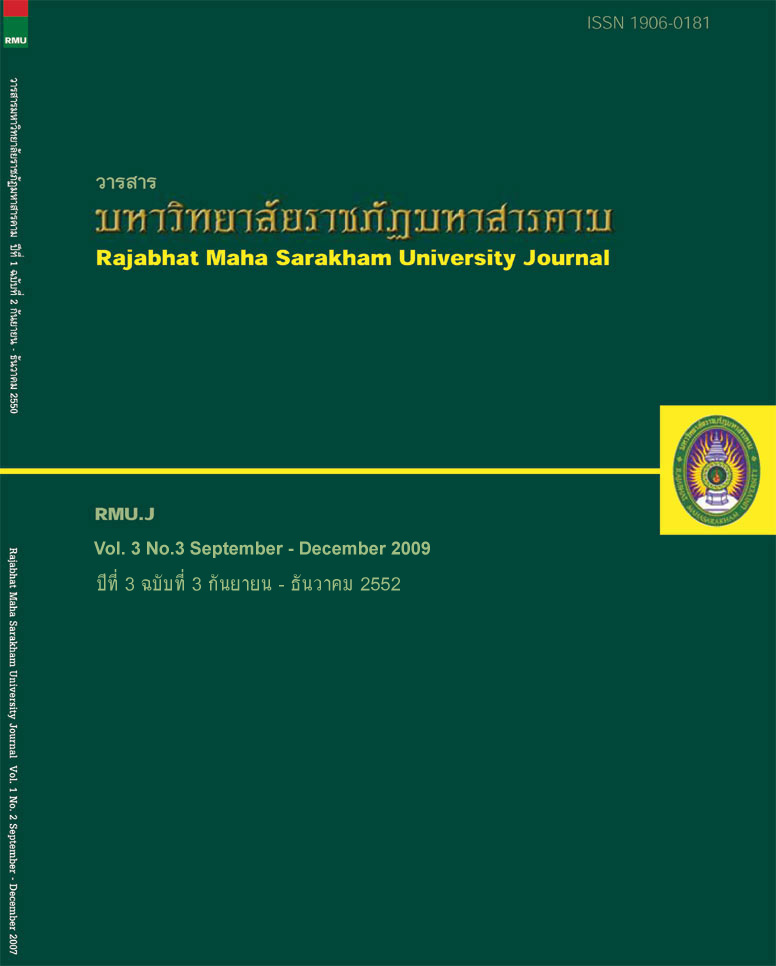รูปแบบความสัมพันธ์เชิงสาเหตุของปัจจัยที่ส่งผลต่อผลสัมฤทธิ์ทางการเรียน วิชาคณิตศาสตร์ ชั้นมัธยมศึกษาปีที่ 3 สังกัดสำนักงานเขตพื้นที่การศึกษากาฬสินธุ์ เขต 2 A Causal Relationship Model of Factors Affecting Mathematics Achievement of Grade 9th Students under
Main Article Content
บทคัดย่อ
คณิตศาสตร์มีบทบาทที่สำคัญยิ่งต่อการพัฒนาความคิดของผู้เรียน ทำให้ผู้เรียน คิดเป็น ทำเป็น แก้ปัญหาเป็นการวิจัยครั้งนี้มีวัตถุประสงค์ เพื่อศึกษาปัจจัยเชิงสาเหตุที่มีอิทธิพลต่อผลสัมฤทธิ์ทางการเรียนวิชาคณิตศาสตร์ของนักเรียน
ชั้นมัธยมศึกษาปีที่ 3 สังกัดสำนักงานเขตพื้นที่การศึกษากาฬสินธุ์ เขต 2 ประกอบด้วยสองขั้นตอนคือ ขั้นแรก พัฒนารูปแบบความสัมพันธ์เชิงสาเหตุของปัจจัยที่มีอิทธิพลต่อผลสัมฤทธิ์ทางการเรียนวิชาคณิตศาสตร์ ขั้นที่สอง ทดสอบความเที่ยงตรงของ
รูปแบบความสัมพันธ์ด้วยข้อมูลเชิงประจักษ์ กลุ่มตัวอย่างเป็นนักเรียนชั้นมัธยมศึกษาปีที่ 3 จำนวน 340 คน สังกัดสำนักงานเขตพื้นที่การศึกษากาฬสินธุ์ เขต 2 คัดเลือกกลุ่มตัวอย่างโดยการสุ่มแบบหลายขั้นตอน การวิเคราะห์ข้อมูลใช้สถิติพื้นฐาน
สัมประสิทธิ์สหสัมพันธ์ และการวิเคราะห์สาเหตุด้วยการวิเคราะห์เส้นทาง (Path analysis) ผลการวิจัยพบว่า
1. ปัจจัยที่มีอิทธิพลต่อผลสัมฤทธิ์ทางการเรียนวิชาคณิตศาสตร์ ชั้นมัธยมศึกษาปีที่ 3 ได้แก่ เชาวน์ปัญญาด้านตรรกะคณิตศาสตร์ ความรู้พื้นฐานเดิม แรงจูงใจใฝ่สัมฤทธิ์ และเจตคติต่อวิชาคณิตศาสตร์ ส่วนอัตมโนทัศน์ การอบรมเลี้ยงดูแบบเข้มงวดกวดขัน การอบรมเลี้ยงดูแบบปล่อยปละละเลย และความพึงพอใจต่อวิชาคณิตศาสตร์ ไม่มีอิทธิพลต่อผลสัมฤทธิ์ทางการเรียนวิชาคณิตศาสตร์
2. ปัจจัยที่มีอิทธิพลโดยตรงต่อผลสัมฤทธิ์ทางการเรียนวิชาคณิตศาสตร์ ได้แก่ เชาวน์ปัญญาด้านตรรกะคณิตศาสตร์ส่วนปัจจัยที่มีอิทธิพลทั้งทางตรงและทางอ้อมต่อผลสัมฤทธิ์ทางการเรียนวิชาคณิตศาสตร์ ได้แก่ แรงจูงใจใฝ่สัมฤทธิ์และเจตคติ
ต่อวิชาคณิตศาสตร์ และปัจจัยที่มีอิทธิพลทางอ้อมต่อผลสัมฤทธิ์ทางการเรียนวิชาคณิตศาสตร์ ได้แก่ ความรู้พื้นฐานเดิม
Mathematics has become an important role to develop students’ thought in helping them to
think, perform, and solve problems. This research aimed to study causal factors affecting mathematics
achievement of Grade 9th students under Kalasin Educational Service Area Office 2. There were two
phases: the first phase, to develop a causal relationship model of factors affecting mathematics
achievement, the second phase, to investigate the validity of the casual relationship by using empirical
data. Subjects were 340 Grade 9th students, selected through multi-stage random sampling. The
statistics used for analyzing the data were correlation coefficient, and path analysis.
Results of the research were as follows:
1. Factors affecting students’ mathematics achievement were logical-mathematical
intelligence, background knowledge, achievement motivation and attitude toward mathematics while
self-concept, strictly controlled child-rearing practice, permissive child-rearing practice and satisfaction
toward mathematics did not affect for their mathematics achievement.
2. Factors directly affected the students’ mathematics achievement is logical: mathematical
intelligence, the factors both directly and indirectly affecting their mathematics achievement such as
motivation and attitude toward mathematics, and the factor indirectly affecting the students’
mathematics achievement is background knowledge.
Article Details
1. บทความที่ลงตีพิมพ์ทุกเรื่องได้รับการตรวจทางวิชาการโดยผู้ประเมินอิสระ ผู้ทรงคุณวุฒิ (Peer Review) สาขาที่เกี่ยวข้อง อย่างน้อย 3 ท่าน ในรูปแบบ Double blind review
2. ข้อคิดเห็นใด ๆ ของบทความที่ลงตีพิมพ์ในวารสารมหาวิทยาลัยราชภัฏมหาสารคาม นี้เป็นของผู้เขียน คณะผู้จัดทำวารสารไม่จำเป็นต้องเห็นด้วย
3. กองบรรณาธิการวารสารมหาวิทยาลัยราชภัฏมหาสารคาม ไม่สงวนสิทธิ์การคัดลอกแต่ให้อ้างอิงแสดงที่มา


